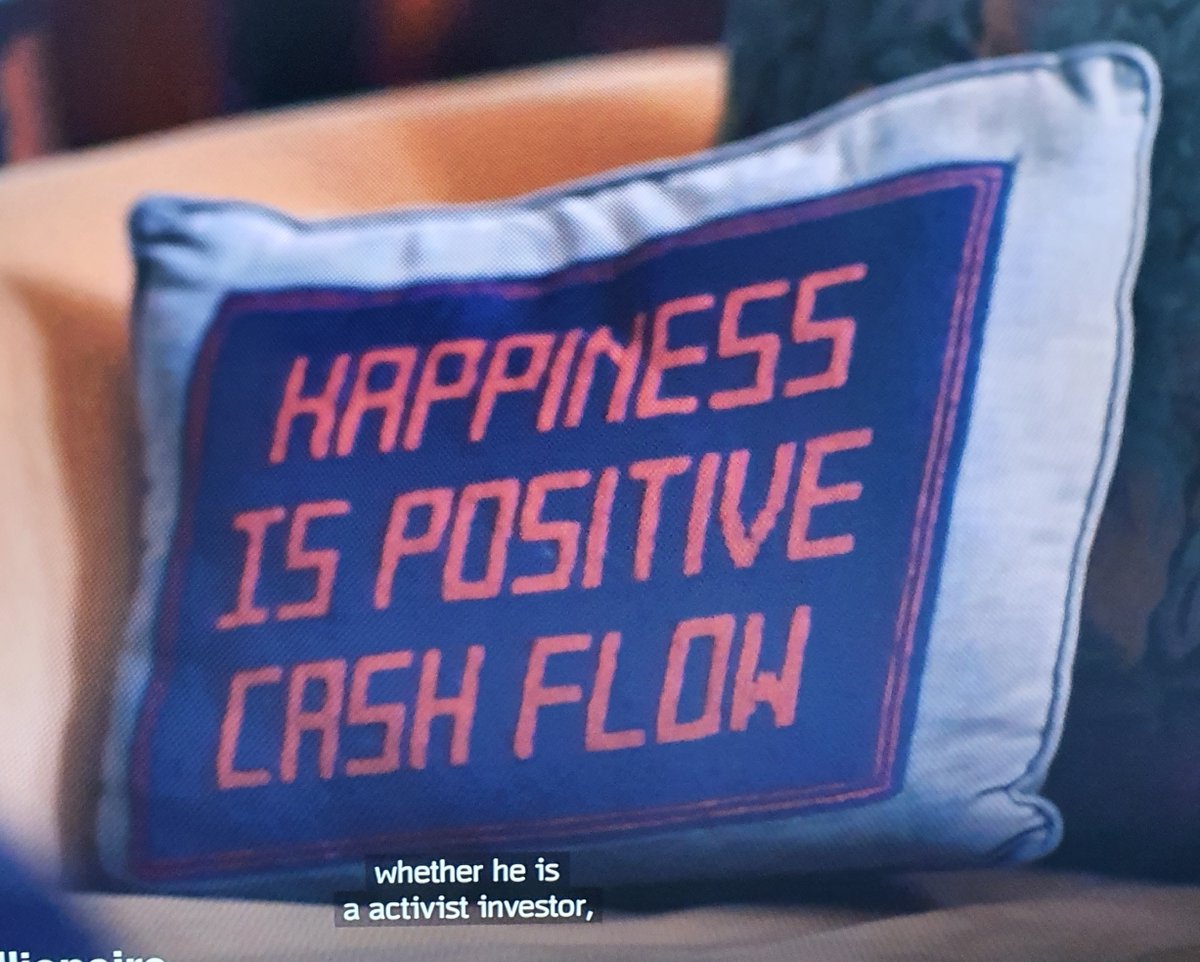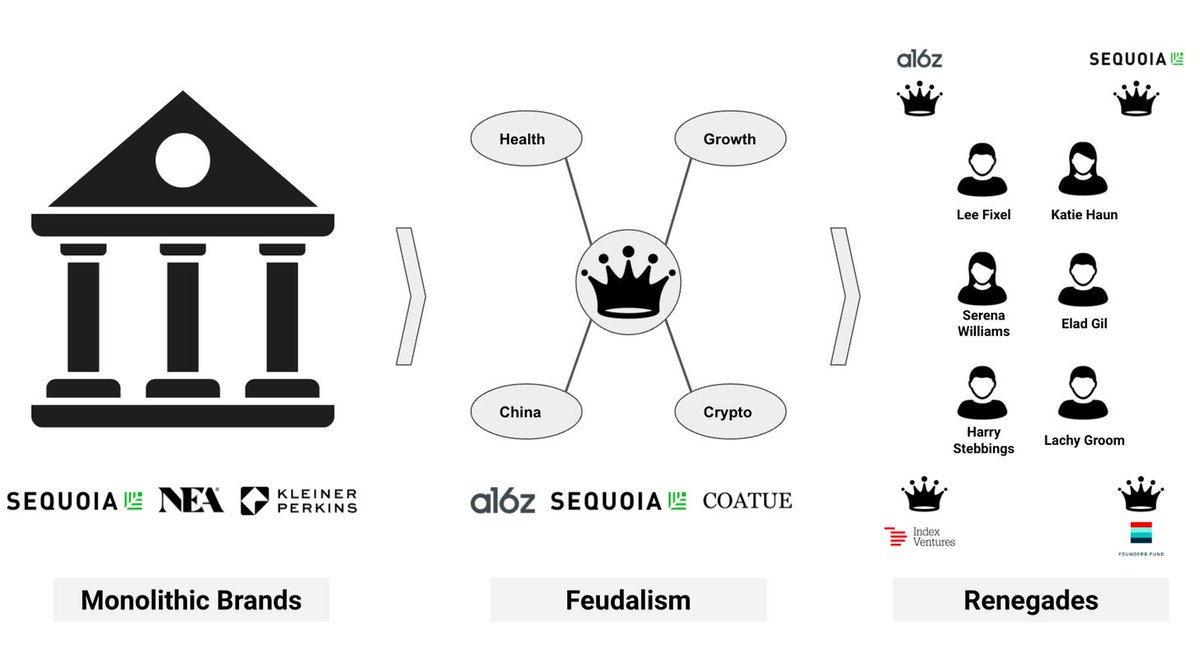
Some nuggets from the excellent new documentary on @Carl_C_Icahn on HBO
"You get a great feeling when you find a company, when you find something you can do. You get excited by it. Something goes 'click,' and you know it's good. When I hear the click, I know I won."
"You get a great feeling when you find a company, when you find something you can do. You get excited by it. Something goes 'click,' and you know it's good. When I hear the click, I know I won."

It's not about money (okay, it is not *only* about money):
"The money is just sort of a goal. It's like, the explorers, why do they keep doing it? They believed in going for the gold, like Cortes and these guys. But the finding and doing is much more exciting than having it ...
"The money is just sort of a goal. It's like, the explorers, why do they keep doing it? They believed in going for the gold, like Cortes and these guys. But the finding and doing is much more exciting than having it ...
I think that's why you find a lot of rich people get very neurotic. Cause they're disappointed when they have it. It's not what it's drummed up to be."
"Part of my values is to make money and I can't change my values. A great painters love to paint. What do you do, criticize him because he likes to paint? But what makes me fulfilled about it is that I also believe I'm making money by doing the right thing." 

On the need for activism:
"Companies are the backbone of our society and many are terribly managed and there's no accountability. I think I proved it by making all this money. This system should be changed and that we should have true corporate democracy and accountability."
"Companies are the backbone of our society and many are terribly managed and there's no accountability. I think I proved it by making all this money. This system should be changed and that we should have true corporate democracy and accountability."
"Frankly, I made this money because the system is so bad, not 'cause I’m a genius.”
Losing everything was Carl's most important lesson:
"When I got out of the army I went to Wall Street because I was into stocks, I was into making money.
I got in the training program at Dreyfus and started investing and it fit perfectly for me."
"When I got out of the army I went to Wall Street because I was into stocks, I was into making money.
I got in the training program at Dreyfus and started investing and it fit perfectly for me."
"I'm making a fortune, all this money. I bought a Galaxy convertible. I had a beautiful girlfriend. Life was good. I figured 'this is the easiest damn thing I ever did.'
Jack Dreyfus came to me. He said 'Carl, you're a smart guy. You're gonna lose every penny you got there.'"
Jack Dreyfus came to me. He said 'Carl, you're a smart guy. You're gonna lose every penny you got there.'"

"Learn to be an investor, not what you do. You're just one of the fools."
I said, 'Come on, Jack, move over.' We're laughing.
I learned a great lesson. You always pay for hubris."
I said, 'Come on, Jack, move over.' We're laughing.
I learned a great lesson. You always pay for hubris."
"In '62, the market broke. Terrible. Jack was right. I was wiped out. I don't know which went first, the Galaxy or the girlfriend I had.
After that I never played market again.
Literally, I went to work. I had to learn one area and be an expert in it."
After that I never played market again.
Literally, I went to work. I had to learn one area and be an expert in it."

"I looked at the option world. I realized there was something awry. The option brokers were all, I wouldn't say thieves, but you would say they didn't give a damn."
"I came up with something called the Midweek Option Report that would tell people, this is what you should be getting for your options and this is what you got, and you got screwed." 

"When I started out, I learned the hard way, playing the market, it's a competitive area, it's gambling.
Too many variables, too many people competing with you. You can't believe that the gambling will carry you."
Too many variables, too many people competing with you. You can't believe that the gambling will carry you."
Looking for no-brainers.
"You look for something I call a 'no-brainer.' Very little risk, but a lot of reward. After a while, it becomes somewhat instinctive, that you see something that's not really apparent to everyone."
"You look for something I call a 'no-brainer.' Very little risk, but a lot of reward. After a while, it becomes somewhat instinctive, that you see something that's not really apparent to everyone."
"But you have to have a passion for it. You get a great feeling when you find a company, when you find something you can do. You get excited by it.
And by instinct now, something goes 'click,' and you know it's good.
When I hear the click, I know I won."
And by instinct now, something goes 'click,' and you know it's good.
When I hear the click, I know I won."
"There's tough times when you're not gonna enjoy it. You gotta be willing to say, 'hey, if I lose so what.'"
Hence one of his favorite poems - If by Rudyard Kipling:
If you can meet with Triumph and Disaster
And treat those two impostors just the same
poetryfoundation.org/poems/46473/if…
Hence one of his favorite poems - If by Rudyard Kipling:
If you can meet with Triumph and Disaster
And treat those two impostors just the same
poetryfoundation.org/poems/46473/if…
On being driven.
"It's like Alexander the Great, right? He's 31 years old and he won Persia. To everybody in the world, he was the best and the greatest.
But he cried because he didn't think there was any place else to go to do a battle.
"It's like Alexander the Great, right? He's 31 years old and he won Persia. To everybody in the world, he was the best and the greatest.
But he cried because he didn't think there was any place else to go to do a battle.
He put his army together and then he went to India.
The army all worshiped him, but a lot of them deserted because they said he was crazy.
He just kept going and going until they killed him. And I think about that. I’m a little bit like that. Just keep going at it.”
The army all worshiped him, but a lot of them deserted because they said he was crazy.
He just kept going and going until they killed him. And I think about that. I’m a little bit like that. Just keep going at it.”

"I thought I was one of those geniuses. I lost everything I had in one week."
He even had to sell his convertible to pay for rent.
"That hurt the most."
He even had to sell his convertible to pay for rent.
"That hurt the most."
https://twitter.com/NeckarValue/status/980468036124729346
• • •
Missing some Tweet in this thread? You can try to
force a refresh












